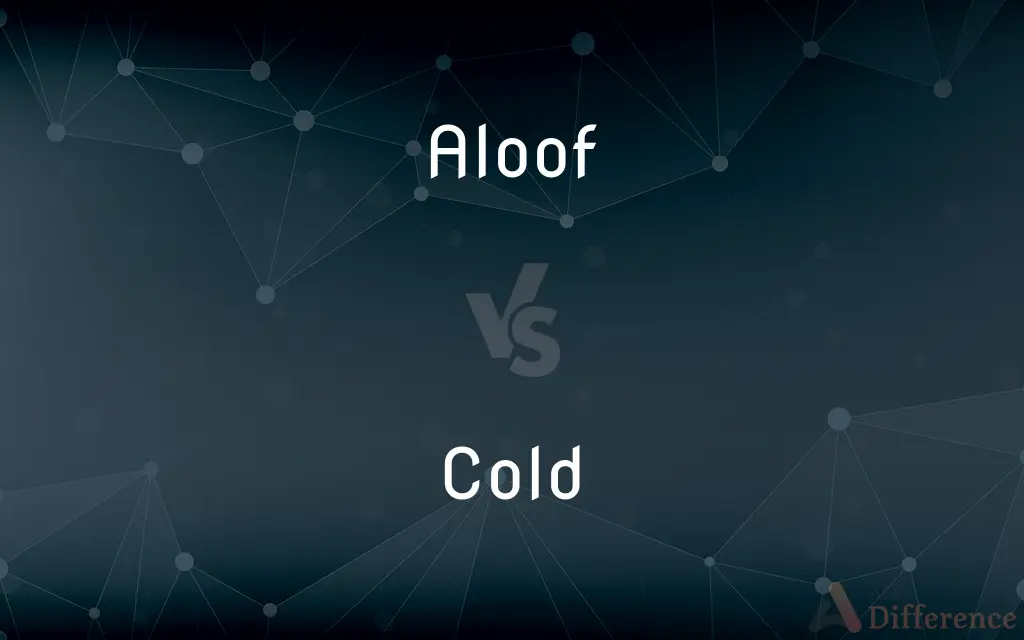Aloof vs. Cold — What's the Difference?
By Fiza Rafique & Maham Liaqat — Updated on May 9, 2024
Aloofness involves emotional distance with a sense of superiority; coldness reflects emotional detachment or indifference, often perceived as unfriendly.

Difference Between Aloof and Cold
Table of Contents
ADVERTISEMENT
Key Differences
Being aloof typically conveys a deliberate distance maintained out of disinterest or a sense of superiority, which can make social interactions seem standoffish. Whereas, being cold denotes a more general lack of warmth or emotion in behavior, making a person seem unfriendly or unemotional.
Aloof individuals often appear reserved or disengaged during social situations, suggesting a lack of interest in engaging with others. On the other hand, cold individuals may engage, but do so without emotional warmth, which can create a barrier in forming close relationships.
The perception of aloofness can stem from an individual’s intention to remain apart from others, which is sometimes seen as elitist. In contrast, coldness does not necessarily carry an implication of superiority but rather an absence of emotional expression.
Aloof behavior can sometimes protect one's personal space and emotions by setting boundaries that are more about personal comfort levels. Conversely, cold behavior might be a defensive mechanism, protecting oneself from emotional vulnerabilities.
In communication, someone who is aloof might limit their interaction to avoid forming connections, often appearing unapproachable. Whereas a cold person might communicate in a straightforward, minimalistic manner that lacks warmth or empathy.
ADVERTISEMENT
Comparison Chart
Emotional Tone
Detached with a hint of disdain
Emotionally unresponsive
Interaction Style
Limited and selective
Minimalist and straightforward
Perception
Elitist or superior
Unfriendly or indifferent
Purpose
Maintain personal comfort
Protect from emotional hurt
Impact on Relationships
Prevents close bonds
Creates barriers to closeness
Compare with Definitions
Aloof
Indifferent; not emotionally responsive.
She was aloof to the criticism about her work.
Cold
Affecting the observer with discomfort or disapproval.
The cold atmosphere in the room was unwelcoming.
Aloof
Uninvolved with people or events; remote.
His aloof nature made him difficult to get to know.
Cold
Lacking affection or warmth of feeling.
She gave him a cold stare that said everything.
Aloof
Detached or distant in interest or feelings.
She remained aloof during the heated debate.
Cold
Impersonal and reserved.
His cold, formal manner was intimidating.
Aloof
Showing a lack of sympathy or warmth.
He responded to the plea for help with an aloof dismissal.
Cold
Indifferent; showing little interest.
Her cold demeanor during the meeting was noticeable.
Aloof
Physically distant; standing apart.
He stood aloof from the crowd at the party.
Cold
Unemotional and dispassionate.
His cold response left everyone uneasy.
Aloof
Emotionally reserved or indifferent
An aloof manner.
Cold
Cold is the presence of low temperature, especially in the atmosphere. In common usage, cold is often a subjective perception.
Aloof
Distant or uninvolved
Remained aloof from political movements.
Cold
Having a low temperature
Cold water.
Aloof
At or from a distance, but within view, or at a small distance; apart; away.
Cold
Being at a temperature that is less than what is required or what is normal
Cold oatmeal.
Aloof
Without sympathy; unfavorably.
Cold
Chilled by refrigeration or ice
Cold beer.
Aloof
Reserved and remote; either physically or emotionally distant; standoffish.
Cold
Feeling no warmth; uncomfortably chilled
We were cold sitting by the drafty windows.
Aloof
(obsolete) Away from; clear of.
Cold
Lacking emotion; objective
Cold logic.
Aloof
Same as Alewife.
Cold
Having little appeal to the senses or feelings
A cold decor.
Aloof
At or from a distance, but within view, or at a small distance; apart; away.
Our palace stood aloof from streets.
Cold
Designating or being in a tone or color, such as pale gray, that suggests little warmth.
Aloof
Without sympathy; unfavorably.
To make the Bible as from the hand of God, and then to look at it aloof and with caution, is the worst of all impieties.
Cold
Not affectionate or friendly; aloof
A cold person.
A cold nod.
Aloof
Away from; clear from.
Rivetus . . . would fain work himself aloof these rocks and quicksands.
Cold
Exhibiting or feeling no enthusiasm
A cold audience.
A cold response to the new play.
A concert that left me cold.
Aloof
Remote in manner;
Stood apart with aloof dignity
A distant smile
He was upstage with strangers
Cold
Having lost all freshness or vividness through passage of time
Dogs attempting to catch a cold scent.
Aloof
In an aloof manner;
The local gentry and professional classes had held aloof for the school had accepted their sons readily enough
Cold
So intense as to be almost uncontrollable
Cold fury.
Cold
Characterized by repeated failure, especially in a sport or competitive activity
The team fell into a slump of cold shooting.
Cold
To an unqualified degree; totally
Was cold sober.
Cold
With complete finality
We turned him down cold.
Cold
Without advance preparation or introduction
Took the exam cold and passed.
Walked in cold and got the new job.
Cold
Relative lack of warmth
Cold slows down chemical reactions.
Cold
The sensation resulting from lack of warmth; chill.
Cold
A condition of low air temperature; cold weather
Went out into the cold and got a chill.
Cold
A viral infection characterized by inflammation of the mucous membranes lining the upper respiratory passages and usually accompanied by malaise, fever, chills, coughing, and sneezing. Also called common cold, coryza.
Cold
(of a thing) Having a low temperature.
A cold wind whistled through the trees.
Cold
(of the weather) Causing the air to be cold.
The forecast is that it will be very cold today.
Cold
(of a person or animal) Feeling the sensation of coldness, especially to the point of discomfort.
She was so cold she was shivering.
Cold
Unfriendly; emotionally distant or unfeeling.
She shot me a cold glance before turning her back.
Cold
Dispassionate; not prejudiced or partisan; impartial.
Let's look at this tomorrow with a cold head.
He's a nice guy, but the cold facts say we should fire him.
The cold truth is that states rarely undertake military action unless their national interests are at stake.
Cold
Completely unprepared; without introduction.
He was assigned cold calls for the first three months.
Cold
Unconscious or deeply asleep; deprived of the metaphorical heat associated with life or consciousness.
I knocked him out cold.
After one more beer he passed out cold.
Cold
(usually with "have" or "know" transitively) Perfectly, exactly, completely; by heart; down pat.
Practice your music scales until you know them cold.
Try both these maneuvers until you have them cold and can do them in the dark without thinking.
Rehearse your lines until you have them down cold.
Keep that list in front of you, or memorize it cold.
Cold
(usually with "have" transitively) Cornered; done for.
With that receipt, we have them cold for fraud.
Criminal interrogation. Initially they will dream up explanations faster than you could ever do so, but when they become fatigued, often they will acknowledge that you have them cold.
Cold
(obsolete) Not pungent or acrid.
Cold
(obsolete) Unexciting; dull; uninteresting.
Cold
Affecting the sense of smell (as of hunting dogs) only feebly; having lost its odour.
A cold scent
Cold
(obsolete) Not sensitive; not acute.
Cold
Distant; said, in the game of hunting for some object, of a seeker remote from the thing concealed. Compare warm and hot.
You're cold … getting warmer … hot! You've found it!
Cold
(painting) Having a bluish effect; not warm in colour.
Cold
(databases) Rarely used or accessed, and thus able to be relegated to slower storage.
Cold
(informal) Without compassion; heartless; ruthless.
I can't believe she said that...that was cold!
Cold
(informal) Not radioactive.
Cold
(firearm) Not loaded with a round of live ammunition.
Cold
Without electrical power being supplied.
Cold
A condition of low temperature.
Come in, out of the cold.
Cold
A harsh place; a place of abandonment.
The former politician was left out in the cold after his friends deserted him.
Cold
(medicine) A common, usually harmless, viral illness, usually with congestion of the nasal passages and sometimes fever.
I caught a miserable cold and had to stay home for a week
Cold
(slang) rheum, sleepy dust
Cold
At a low temperature.
The steel was processed cold.
Cold
Without preparation.
The speaker went in cold and floundered for a topic.
Cold
In a cold, frank, or realistically honest manner.
Cold
Deprived of heat, or having a low temperature; not warm or hot; gelid; frigid.
Cold
Lacking the sensation of warmth; suffering from the absence of heat; chilly; shivering; as, to be cold.
Cold
Not pungent or acrid.
Cold
Wanting in ardor, intensity, warmth, zeal, or passion; spiritless; unconcerned; reserved.
A cold and unconcerned spectator.
No cold relation is a zealous citizen.
Cold
Unwelcome; disagreeable; unsatisfactory.
Cold
Wanting in power to excite; dull; uninteresting.
What a deal of cold business doth a man misspend the better part of life in!
The jest grows cold . . . when in comes on in a second scene.
Cold
Affecting the sense of smell (as of hunting dogs) but feebly; having lost its odor; as, a cold scent.
Cold
Distant; - said, in the game of hunting for some object, of a seeker remote from the thing concealed.
Cold
The relative absence of heat or warmth.
Cold
A morbid state of the animal system produced by exposure to cold or dampness; a catarrh.
Cold
To become cold.
Cold
A mild viral infection involving the nose and respiratory passages (but not the lungs);
Will they never find a cure for the common cold?
Cold
The absence of heat;
The coldness made our breath visible
Come in out of the cold
Cold is a vasoconstrictor
Cold
The sensation produced by low temperatures;
He shivered from the cold
The cold helped clear his head
Cold
Used of physical coldness; having a low or inadequate temperature or feeling a sensation of coldness or having been made cold by e.g. ice or refrigeration;
A cold climate
A cold room
Dinner has gotten cold
Cold fingers
If you are cold, turn up the heat
A cold beer
Cold
Extended meanings; especially of psychological coldness; without human warmth or emotion;
A cold unfriendly nod
A cold and unaffectionate person
A cold impersonal manner
Cold logic
The concert left me cold
Cold
Having lost freshness through passage of time;
A cold trail
Dogs attempting to catch a cold scent
Cold
(color) giving no sensation of warmth;
A cold bluish gray
Cold
Marked by errorless familiarity;
Had her lines cold before rehearsals started
Cold
No longer new; uninteresting;
Cold (or stale) news
Cold
So intense as to be almost uncontrollable;
Cold fury gripped him
Cold
Feeling or showing no enthusiasm;
A cold audience
A cold response to the new play
Cold
Unconscious from a blow or shock or intoxication;
The boxer was out cold
Pass out cold
Cold
Of a seeker; far from the object sought
Cold
Lacking the warmth of life;
Cold in his grave
Common Curiosities
Is it possible to misinterpret someone being cold as aloof?
Yes, since both behaviors involve a form of emotional detachment, they can be easily confused.
How do aloof and cold behaviors affect relationships?
Aloof behavior can prevent the formation of deep connections, whereas cold behavior may create emotional barriers that are hard to cross.
What might cause someone to be cold in their interactions?
Often, past emotional hurts or a natural disposition towards minimal emotional expression.
What differentiates an aloof person from a cold person in social settings?
Aloof people are distant because they choose to be, often feeling superior, while cold people may simply lack emotional warmth.
Is being aloof always a negative trait?
Not necessarily; it can be a way of maintaining personal boundaries.
How do cultural differences impact the perception of aloofness and coldness?
Cultural norms around emotional expression can make aloofness or coldness more or less acceptable.
Can aloofness be mistaken for shyness?
Yes, aloof behavior can sometimes be mistaken for shyness, which is more about discomfort than distraction.
Can aloofness or coldness be a personality trait?
Yes, both can be inherent personality traits, influencing how individuals interact with others.
Can a person be both aloof and cold?
Yes, someone can exhibit both traits, being distant and emotionally unresponsive.
Are there positive aspects to being cold?
Being cold can sometimes protect from emotional pain and help maintain a level of professional detachment.
Share Your Discovery

Previous Comparison
Bin vs. Dump
Next Comparison
Fortitude vs. StrengthAuthor Spotlight
Written by
Fiza RafiqueFiza Rafique is a skilled content writer at AskDifference.com, where she meticulously refines and enhances written pieces. Drawing from her vast editorial expertise, Fiza ensures clarity, accuracy, and precision in every article. Passionate about language, she continually seeks to elevate the quality of content for readers worldwide.
Co-written by
Maham Liaqat















































